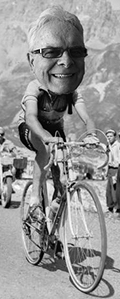The Lucky Few Generation
 Mon, August 8, 2022
Mon, August 8, 2022 My generation were known as the Lucky Few, or sometimes the Silent Few. Born between 1928 and 1945, we came between the Greatest Generation, who fought in WWII, and the Baby Boomers who came after the war. It was the period of the Great Depression and WWII, when fewer babies were born.
I was barely 4 years old when the war started, 9 years old when it ended. I never understood the war, at the time it was all I knew. I guess we were known as the “Fortunate,” or “Lucky” Few because we were too young to be drafted into the military, and we came of age in the 1950s, as the economy boomed after the war.
We were also known as the Silent Few because we did little in the way of protesting, marching or banner carrying. In the UK in the 1950s things were pretty good, and as far as we were concerned there was little to complain about.
In America it was the era of McCarthyism, with people being blacklisted and persecuted for having leftist views, so I would imagine it was wise not to express one’s views publicly.
In the UK too, we grew up with strict discipline, both at home and in the school system. Children were taught to be seen and not heard, and you never questioned or talked back to an adult.
As a result, we grew up completely isolated from adults, neither asking for advice nor seeking their help in any way. Big Business had not caught on to the potential market for fashionable clothes aimed at teenagers. We created our own fashions.
We followed trends of course, just as teens do to this day. We wanted to look different and did so by dressing the same. Fashions for young people started in London, and slowly spread to other areas throughout the UK.
We wore expensive handmade suits made by some of the best tailors in London, cut in the style of the Edwardian era of the early 1900s. (Think of Sherlock Holmes.) The press and general public called us “Teddy Boys” and we were openly ridiculed on the streets. Which I guess gave us the attention we wanted.
Our musical tastes in the early 1950s was Big Band Jazz. I got to see Count Basie, and Duke Ellington when they toured England in the mid-1050s. We frequented jazz clubs in London that featured small jazz trios, quartets, or quintets.
Records we bought and listened to on Juke Boxes were imported from America. I was a huge fan of Hank Williams, as were many other young people in Britain. In 1956 when Elvis Presly hit the scene, along with artists like Chuck Berry and Little Richard they had a large following.
However, not everything coming out of America was accepted by young British people, especially the college kids. They stuck with their interest in jazz, but by 1958 or so had switched their allegiance, to Traditional Jazz, Dixieland, and New Orleans style played in America in the 1920s.
Bands were being formed to play this kind of music, and an offshoot of this was an interest in early American Folk Musicians like Josh White, Woody Guthry, Hudy Ledbetter, and Big Bill Broonzy.
Yet another offshoot was an interest in “The Blues,” played by Black Artists in America. In the 1960s when there was an explosion of British bands and musicians, it may have appeared that this was an overnight sensation, but far from it.
It had been brewing for at least ten or fifteen years before that. Brought about by a generation of young people who did their own thing, created their own styles and had their own musical tastes. Uninfluenced by adults, or large Record Corporations. It spread to America, and the rest of the World, and other young artists carried it forward.
Brought about by a set of circumstances beyond any one person’s control, and being so unique it will probably never happen again. Being born during a World Depression, and spending their childhood during a World War, under a very repressive education system.
I am indeed “Fortunate” to be part of the generation known as the Lucky or Silent Few. The old saying, “You had to be there,” comes to mind, and being there gives me a perspective on life that I would not otherwise have.

















Reader Comments (5)
My mum is from your generation Dave — born in 1940.
I think you're right to say they were fortunate: financially that generation did pretty well; there were no world wars for them to fight and die in and they've seen huge advances in medicine and technology.
Dave,
Not a reaction to this piece but rather a reaction to the body of work: Love to read your thoughts on so many topics; Monday mornings I look forward to each post. Keep doing what you're doing. I wish you well and hope (and assume) the reward of writing is writing itself. Be well, Friend!
ED
Dave, Like Ed, I look forward to, and greatly enjoy your missives on many topics. A question on your latest: Not sure what you mean by “repressive education system?” Could you perhaps expound? Many thanks for your perspectives on so many things…
Kind regards,
Jim
Jim,
By Repressive I meant tyrannical and cruel. This was the 1940s and in British schools there was not only physical beatings with a cane, I think worse was the verbal and emotional abuse. I was constantly told I was “Stupid,” and left school believing this.
As a result, when I became a “Troubled” teen in the 1950s, and I sought psychiatric help, I was then given Electro Convulsive Therapy (ECT.) If you ever watched Pink Floyd’s “The Wall,” they pretty much nailed the British education system, and the mental issues that band member Syd Barrett suffered. “The Wall,” album and movie was based on this, and it touched me deeply.
It took me years to realize that not only was I not stupid, but I was and still am in fact highly intelligent. To this day I have a mistrust of Doctors, Lawyers, and Teachers, anyone with a college education. (Please don’t take it personally if you have one.)
The old saying of, “What doesn’t kill you will make you stronger,” is certainly true in my case. One thing is for sure, no matter how hard I try the past will never improve, all one can do is, accept it, deal with it, and move on. I did this many years ago, but I’ll still write or talk about it if asked. (So thanks for asking.)
Dave
Totally agree with you.